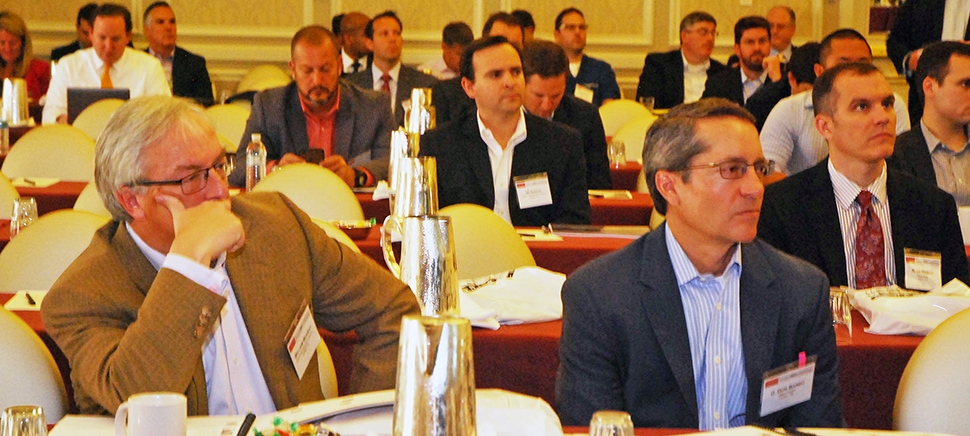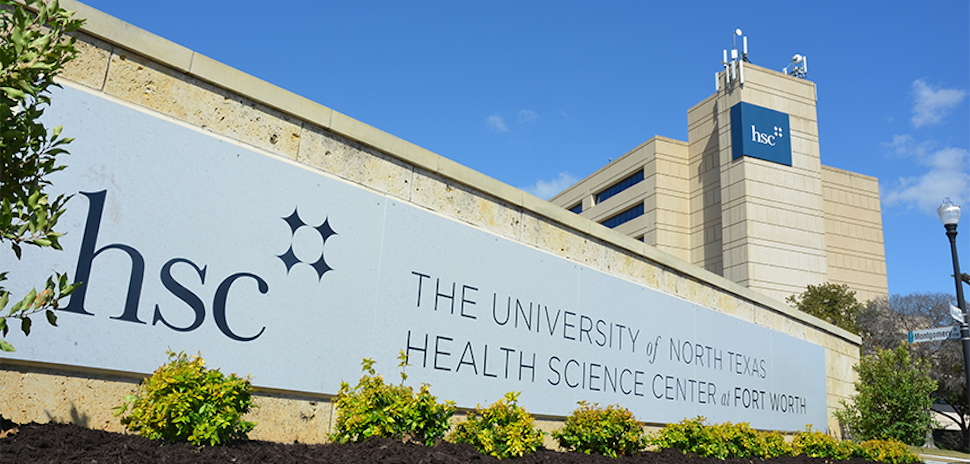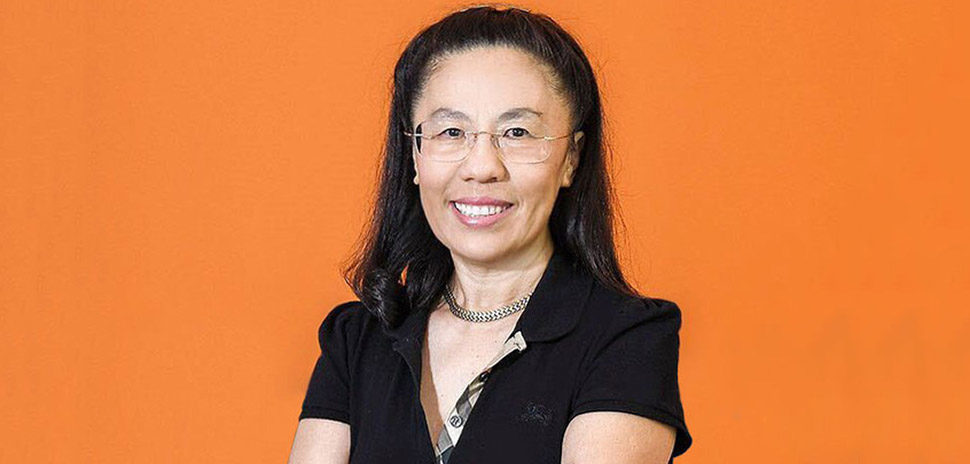INNOVATION CAN HELP CUT HEALTH-CARE COSTS AND IMPROVE PATIENT OUTCOMES
The health-care industry is in the midst of great change in how it’s regulated, how it provides care, the technology it uses, and the way in which it is financed.
Attendees at the 9th Annual Healthcare Dealmakers conference, which kicked off its two-day run Wednesday at the Adolphus Hotel in downtown Dallas, heard industry and investment experts talk about those topics and more.
The Polsinelli law firm holds the conference each year as a forum for health-care providers, their advisers, and capital sources to talk about the challenges and opportunities for dealmaking in the health-care services marketplace. The conference drew 236 attendees on Wednesday, with 200 scheduled to attend on Thursday, said Jonathan Henderson, Polsinelli office managing partner in Dallas.
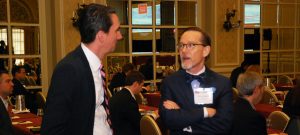
Dr. Hubert Zajicek, CEO and co-founder of Health Wildcatters, left, talks with Dr. David Albert at the conference. (Photos by Lance Murray)
He said, in its first year, the event drew roughly 100 people, and that attendance has risen each year.
CONFERENCE SPEAKER: ‘HEALTH CARE IS UNDER TREMENDOUS PRESSURE’
He said the firm started the conference because it saw a need for a forum in which the health-care industry and investors could come together in one place.
“It’s been a great source of relationships over the years,” Henderson told me of the conference.
Opening the event was a keynote address by Dr. David Albert, chief medical officer of AliveCor Inc., of Oklahoma City. AliveCor creates FDA-cleared “machine learning” techniques to enable proactive heart care, according to its website.
His message was that, “health care is under tremendous pressure, mainly in the United States, mainly from a financial prospective.”
He said, “we spend much more per capita than any other country in the world, and our outcomes are not equivalent to the level of our expenditure.”
He said the government is going to try to control costs and shift the risk onto the health-care provider.
He said that “risk-shifting” will occur whether its under Obamacare or under a program such as that proposed by House Speaker Paul Ryan.
“Some companies will have a target on them.” – Dr. David Albert
“Some companies will have a target on them,” Albert told conference attendees.
“It is going to be a startling change for many people, for many organizations,” he told me.
Because of such things as re-admission penalties, hospitals will have to be more concerned about financials than ever, he said.
He said that digital health, with its constant monitoring, will help moderate costs, and that the cellphone will be an important part of extending health-care’s reach to consumers through apps.
“The smartphone is the remote control of your life,” Albert said. “This will become our personal health-care portal.”
He told investors: “I hope you have patience because change in health care is not easy, but it is changing.”
ALL THINGS HEALTHCARE INNOVATION
Albert’s address was followed by a panel titled, “All Things Healthcare Innovation: Telehealth, mHealth and Beyond.”
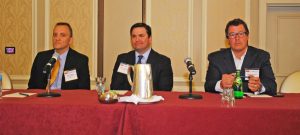
Scott Manis of HCA Healthcare of Dallas; Matt Johnson, CEO of CareCycle of Dallas; and Mark Prather, CEO DispatchHealth of Denver were on a panel that discussed “All Things Healthcare Innovation: Telehealth, mHealth and Beyond.”
On the panel were Lynn Scott, shareholder and chair of Health Care Innovation, Polisinelli, Atlanta; Mark Prather, CEO of DispatchHealth of Denver; Scott Manis, division vice president of regional outreach for HCA Healthcare of Dallas; and Matt Johnson, CEO of CareCycle of Dallas.
Manis told the conference that his company sees innovation as a great way to improve efficiencies.
“We’re completely obsessed with preventing chronic conditions from becoming acute,” he said.
Prather said a point of emphasis needs to be avoiding the emergency room, and that his company’s medical teams arrive at a patient’s home or work with the tools needed to provide either simple or advanced health care.
“Convenience is the new quality. We need to change from ‘patient’ to ‘consumer,’” Prather said.
Manis said that specialist physicians are high-priced, and sometimes low in number in a given region.
Because of that, he said, HCA is trying to find ways “to make a specialist in multiple places,” whether that is in office or a mobile visit. He said HCA also is looking at efficiencies in which physicians in slower emergency rooms can cross over to busier ones to improve care.
Johnson said his company engages with clients on both an at-large and on a post-operative basis, and that “post-op has significantly higher engagement than the at-large” client base.
Engagement is important, Prather said.
“The patient has to be engaged to manage their health care,” – Mark Prather
“The patient has to be engaged to manage their health care,” he said.
BIG DATA COULD HELP REALIZE BIG SAVINGS
A panel discussion on “Big Data Analytics in Healthcare,” featured Pete Periales, chief strategy officer and senior vice president population health for Children’s Health System of Texas in Dallas; Dr. Ruben Amarasingham, founder and CEO, PCCI and Pieces Technologies of Dallas; and Jay Reddy, co-founder and CEO of VitreosHealth of Plano.
The use of big data is a new, increasingly important component of health care that is slowly gaining wider use.
“Health care in general, is a very cautious industry,” Amarasingham said.
He said big data is becoming more useful in supporting health-care decisions, and is a critical part of predictive health care. Amarasingham said that the industry also is using big data to help assess risk.
He said, however, that the ethics of machine intelligence in health care raises “significant concerns.”
Reddy said the goal of big data is reduce patient costs.
“We see it as shedding light on dark data,” Reddy said by stitching data together.
“Big data has to be to about big thinking,” Reddy said, and that, “big data has to be about big outcomes.”
Both PCCI and Pieces Technologies and VitreosHealth recently completed Series A rounds of investment.
VENTURE CAPITAL IN NONPROFIT HEALTH SYSTEMS
Henderson then moderated a panel on “Nonprofit Health System Strategic Venture Capital: An Update from Leaders in the Marketplace.”
Michele Clark, president of Children’s Health Systems of Texas Ventures of Dallas; Ryan Schuler, managing director of Ascension Ventures of Clayton, Missouri; and Bobby Helmedeg, director of operations for Rex Health Ventures of Raleigh, North Carolina, comprised the panel.
“Innovation is tremendously important for us when you look at the outcomes.” – Michele Clark
Clark leads the newest of those three ventures, and she said Children’s is looking for innovative things that “can create cost savings,” and that can keep children “in the mainstream of life,” while they are engaged in the health system.
She cited as an example that Children’s, formerly known as Children’s Medical Center, is in five to seven schools in the Dallas area this year with a telehealth program, and that it hopes to be in 100 by the end of next year.
“Innovation is tremendously important for us when you look at the outcomes,” she said.
She said the investment is about “keeping those kids in school.”
FINDING COST SAVINGS IN UTILITIES, MANPOWER TIME
Ryan said that Ascension likes “to fund partners that bring something unique to the table,” to create a winning partnership.
Helmedeg cited one company that his fund invested in that invented a type of refrigerator that had no compressor and didn’t use freon. The unit used less electricity than conventional refrigeration, and, because it is Wi-Fi enabled, reported temperature readings itself.
That meant staff no longer had to physically check refrigerator temperatures, creating a utility cost savings and increased manpower efficiencies.
In the afternoon, The Healthcare Innovators Pitch Competition showcased companies seeking the $5,000 top prize and exposure to the investment community.
READ MORE:
Healthcare Dealmakers Conference 2016
Socrates Health Solutions Wins Pitch Competition in Dallas
Chris Kersey: Health-care Industry Bolsters Hacker Defenses
To follow coverage of the Healthcare Dealmakers Conference, and get a daily dose of what’s new and next in Dallas-Fort Worth innovation, subscribe to our Dallas Innovates e-newsletter.

